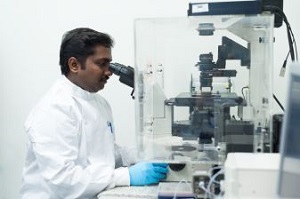New venomous snakebites research gets funding boost
04 August 2020

New treatments for snakebites will move one step closer, thanks to new funding for innovative research at the University of Reading.
Dr Sakthi Vaiyapuri has been awarded new funding from the Royal Society Leverhulme Trust Senior Research Fellowship to significantly advance his research into the development of new treatments for venomous snakebites.
The latest funding will help Dr Vaiyapuri, in collaboration with Professor Ketan Patel from the School of Biological Sciences, to look at the effect of viper bites on humans which frequently leads to incurable muscle damage, leaving a large number of victims permanently disabled.
Dr Sakthi Vaiyapuri, an Associate Professor in Cardiovascular and Venom Pharmacology at the University of Reading, said:
“Snakebites are recognised by the WHO as a high priority neglected health issue, leaving nearly half a million people permanently disabled largely as a result of viper bites and causing 140,000 fatalities each year.
“Our new research will be looking at the effect of viper venoms on muscle stem cells as our current understanding is that the venom toxins stop muscles from being able to automatically repair following venom-induced damage, which leads to permanent disabilities.
“Currently used anti-snake venoms are largely ineffective in treating snakebite-induced muscle damage and subsequent permanent disabilities even though around 70% of venomous snakebites are caused by vipers, so there is a crucial need to find ways to treat snakebite-induced muscle damage.”
The team from the University of Reading, King’s College, London and Technical University of Denmark will be using the venom from a most common venomous snake in India, the Russell’s viper, to look at how muscle stem cells respond to the toxins from this venom.
The team hope that their work will lead to the identification of new drugs that can treat and/or prevent snakebite-induced muscle damage.
Watch a video where Dr Sakthi Vaiyapuri explains about his work raising awareness of the dangers of snakebites in rural Tamil Nadu, India here.
